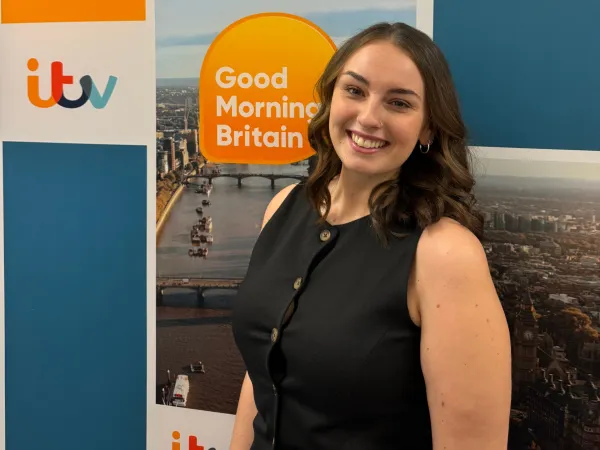When I was 18, I went to Brighton to study singing and music at university, and finished my degree in July 2020, at the height of COVID-19. It wasn’t a great time to get a job, and I felt that some of my time at university had been taken away from me because of the pandemic. I decided to stay on and do a master's and teaching year all in one, which I knew would be really intense.
This started in September 2020, the same month my mum became unwell, and I had to go home to Jersey for a few weeks to look after her. While there, I suddenly started to feel really tired, but in my head, I was rationalising this by telling myself it was because I was looking after my mum and starting a new course.
When I began university, I found it really difficult. I was sleeping a lot – sometimes for 12 hours and still being tired. Then one day I started getting rashes on my face. I would get the same rash, which was always the same shape. It would happen whenever I’d eat food, put makeup on, put on perfume, or be around cleaning products. I didn't think much to it at first but as things carried on, I booked a GP appointment.
This was when the country went into the second lockdown, and rules were strict. I had an appointment by phone, where my concerns were completely dismissed. I was told I couldn’t see a doctor over a rash, and to call back when the pandemic was over. My worries were completely invalidated, and when someone does that to you, it puts you off seeking help again.
I remember them suggesting my symptoms could be down to the student lifestyle, doing things like smoking, drinking and going out. But I wasn’t doing any of those things. I was very health conscious – and besides, we weren't allowed to! As someone who looked after themself quite well, to be told that really upset me.
Symptoms began to worsen
After a month or two of getting rashes, I was in my room after having dinner with my housemate. Everyone else had gone home because of lockdown, but, because of travel restrictions, I couldn't get a flight to Jersey. I was on FaceTime to my parents, and I was looking at myself thinking I'd put on a bit of weight. I looked in the mirror and could see my face swelling up.
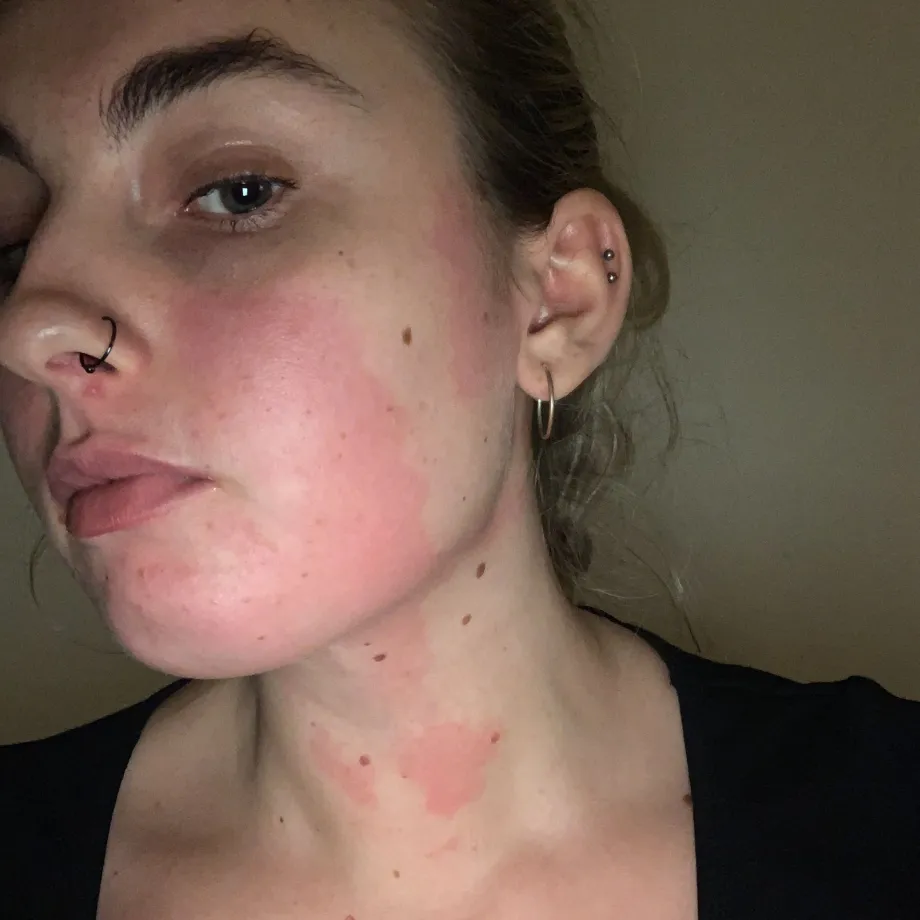
I didn’t know it, but I was having anaphylactic shock, which is a life-threatening reaction. I'd never had anything like it. I thought I was having a heart attack, so panic quickly set in. I hung up the phone and stumbled to the other room to tell my friend to call an ambulance. She didn’t even question it as she could see something was very wrong.
The paramedics took me to hospital because I’d had anaphylactic shock and asked my friend if I was allergic to anything. My friend said I wasn’t but mentioned the rashes to them. The paramedics then told her that when you're in your twenties, young women can develop an allergy to fish. The doctors at the hospital stabilised me and when I got home my friend told me about the paramedic’s comment. I was already a pescetarian, so I cut out fish from my diet and became a vegetarian.
I was quite anxious after what happened. I’d struggle to eat because I was so petrified of having a reaction. And then I started having them all the time. From November to February, I was admitted to hospital a dozen times with anaphylactic shock. I lost three stone because every time I went, I was told to not eat something anymore. What’s more, I could only eat when someone else was in the house, because if I had a reaction, I wouldn't be able to call an ambulance. I literally couldn’t eat on my own. It was very scary, but no one was offering me any answers. Not once did anyone say we're going to refer me to try to get to the bottom of things. It was extremely frustrating, scary, and isolating.
Going back home to Jersey
During COVID-19, you needed permission from Jersey’s government to book flights home. But as soon as my mum contacted them and said my daughter's having life-threatening reactions, they got me on a plane.
Going home was a pivotal moment for me. The island hospital said they could admit me straight away and start the ball rolling from there. Though this was really positive, it was also quite upsetting because now someone had actually said that they were really worried about me.
Despite being home, I was still very isolated. I had to try and explain to people that
I could no longer do any of the things I could before, like drink alcohol, or even wear makeup. I had to eat with someone, I could barely go out the house. It was a very confusing time.
The doctors started doing more tests and found I had something called mast cell activation syndrome (MCAS), where mast cells become overactive and release excessive amounts of chemicals. The only reason I got diagnosed with that is because I did a lot of research and saw someone on TikTok who had it and I asked if I could have it too.
Pushing for more answers
I knew that my MCAS diagnosis wasn't the full extent of my issues, there was still more to what was going on with me. My mum had brought up cancer with the doctors but had been completely dismissed. There was no further support or investigations. It was just, ‘go away now, your problem’s solved’. But it wasn't solved. I was so tired still and I was itchy all the time. I was having night sweats, too.
I told doctors I’d seen Demi Jones, from Love Island, on Good Morning Britain talking about having thyroid cancer, and asked if I could also have it. I’d felt my neck hurt and I'd had trouble swallowing, which I’d been told was because I'd been having anaphylactic shock. They had an answer for everything, but now I had a big lump in my throat, and I kept pushing.
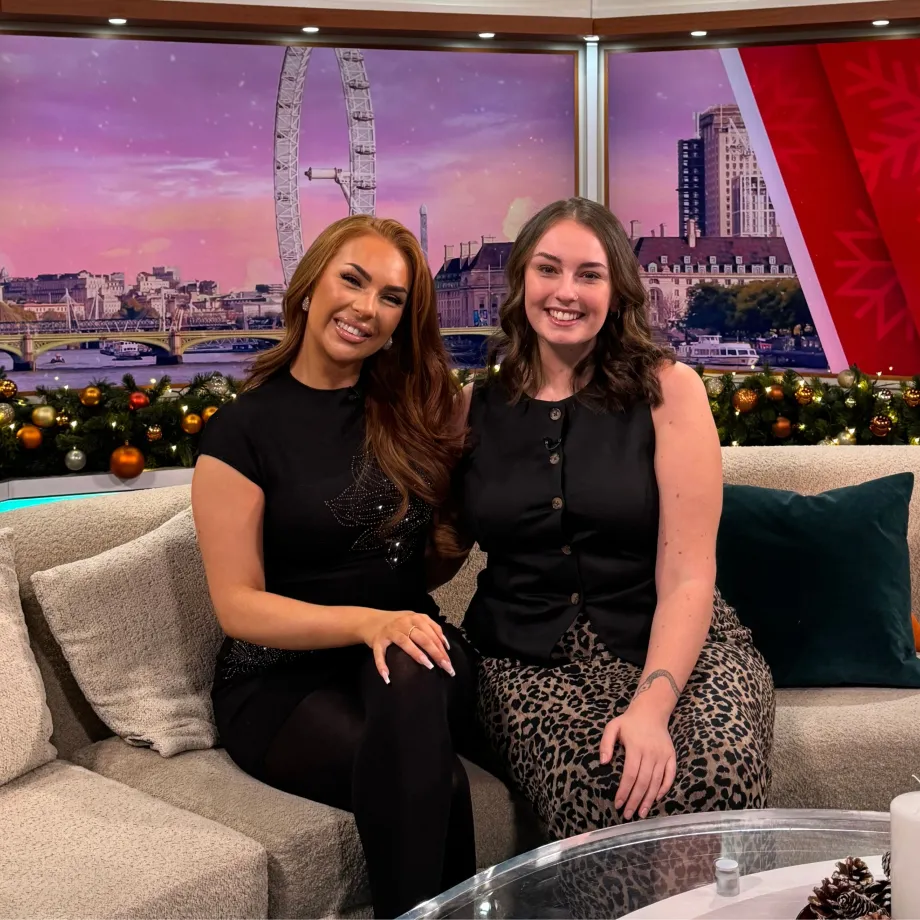
Demi Jones and Antonia on Good Morning Britain
Every time I went to the GP to talk about my allergies, I'd say I've got a lump but was told I had anxiety because of everything I’d been through. It was very dismissive. I was adamant something was seriously wrong, but nothing else was ever considered. I've seen so many oncologists since who can’t believe that nobody sent me for a scan.
Two years after first becoming ill, I went to the ear, nose and throat department (ENT), having fought for an appointment. There, the doctor said they could feel something in my neck and that they were going to refer me for an ultrasound. However, six months went by, and I hadn't heard anything. I was chasing and chasing to get this scan.
By this time, I was getting so fed up – I was at the age where all my friends were getting on with life and moving in with their partners, getting engaged, or having babies. It was so demoralising. And I couldn't do these things that other people were doing. It was hard. My whole career in music and singing was ruined, too, because I'd had problems with my throat. It was like no one really cared about that. All they cared about was that I wasn't having anaphylactic shock. I wasn't being listened to.
I went through stages of really chasing the hospital and then a few months of wanting to give up. Eventually, I was sent for an ultrasound, because of the lump in my throat, which they were calling a slow-growing nodule. Again, I asked if I had cancer, but was told I was far too young to have it.
I was referred back to the ENT, as it was deemed nothing to worry about and didn’t look like cancer, and there they said they’d monitor things and scan me again in six months. I asked them what other options there were and was told they could do a biopsy. However, as the waiting list was long, and I wasn’t considered ‘urgent’, I’d be put to the bottom of the list because of my age and other factors.
Taking control
I didn't hear anything again for another six months. By then, I'd lost four stone, and I looked really ill. One day, I went back to the ENT, determined not to leave until I spoke to someone. When the doctor I’d seen before came out of the lift, I told him I was the girl he’d seen six months ago and asked him to feel the lump in my throat. He looked concerned, especially when I told him I was struggling to sleep, and that the lump was growing.
He arranged a biopsy, which came back inconclusive. I was told it would be another four months before I could have another, so I decided to go private. I worked in finance at the time, which allowed me to get private healthcare for certain things. I wrote to them about my situation and was told I could have exploratory surgery and have half my thyroid out.
I met the surgeon, and my dad said to him he believed I had cancer. Even then, the surgeon was convinced it wasn’t the case. He said he didn’t think I should have surgery and should wait until the biopsy as the risk of living with half a thyroid was going to be greater than the potential of having cancer.
Determined, I went ahead with the surgery, against his advice. I remember waking up from surgery and could hear someone talking, saying they’d “found two more”, which I later found out were tumours. The surgeon later said it was clear that one tumour had obviously been there for a few years.
Being told I had cancer
The surgeon said I’d get the pathology results back in a week, so when I was phoned about going in to get my stitches out, I asked if they were ready. I was told they weren’t, but the surgeon was going on holiday and wanted to take the stitches out before he went. When I got there, I asked him again if he had my results and he told me he hadn’t checked. So, right there in front of me, he typed in my details. I could see his face change as he read and digested my results.
I remember the moment so vividly. He couldn’t bring himself to say anything. I was looking at my mum who’d started crying. I was hyperventilating. I was so angry, not just from being told I had cancer, but in the way that I was, and after having fought for so long to get my diagnosis.
If I hadn’t asked him to check for my results, I’d have been sent home, and he’d have gone on holiday. There’s no nice way to be told you have cancer, but this wasn’t the right way to find out. It was just typical of everything I had to go through. I'm quite a strong and vocal person, but if I wasn't, I wouldn't have found out I had cancer. By the time I did, it had spread to my lymph nodes, and there were multiple tumours in my neck.
I had to have surgery urgently and had to go to Southampton to have radiotherapy and further surgery. The recovery from the first surgery I had was especially tough and took its toll emotionally and physically.
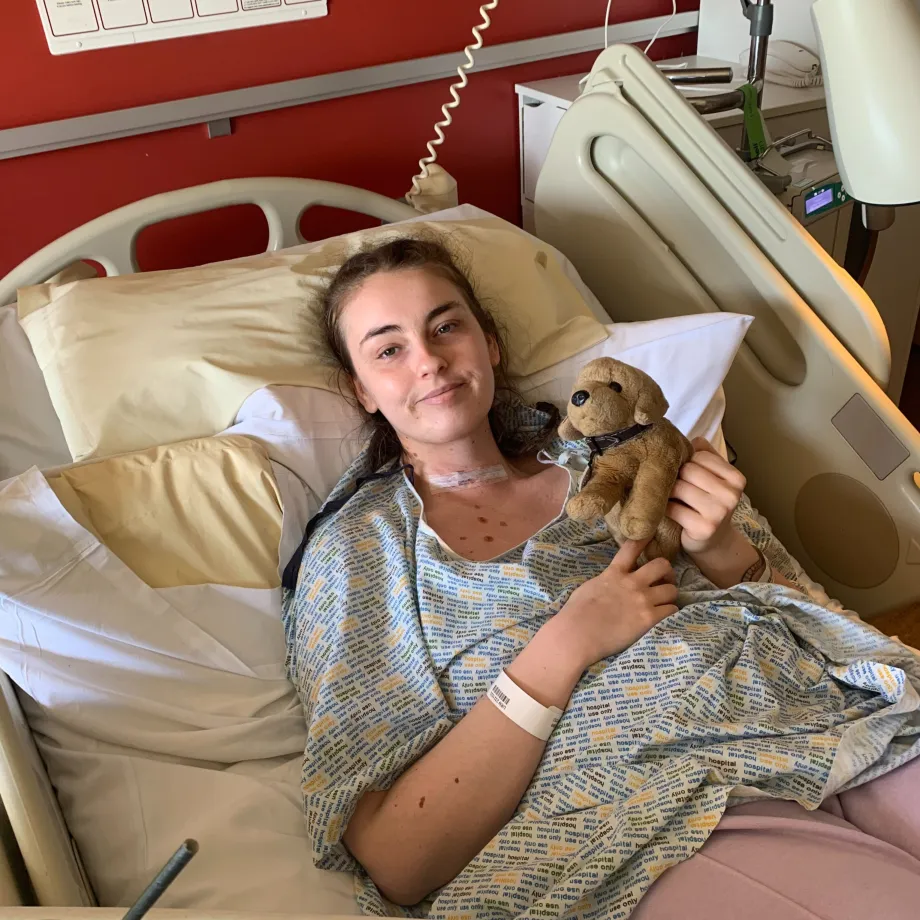
Antonia in hospital
Documenting my journey and raising awareness
I wanted to raise awareness and do some good from the awful situation I was in, but I still had to put myself first. It’s important that you give yourself time to heal and process what's going on. I was really glad I did that.
Two months after my diagnosis, I started to share my story on TikTok. It was important for me that other people learn from my experience, and that included teaching people how to advocate for themselves and their needs, both before and after their diagnosis. I’ve also made it my mission to inform other young people with cancer about which charities, like CCLG, are out there to help them with resources and support. No one did that for me, so when you have a platform like mine, it's vital to put that platform to good use and spread information that's going to benefit people.
The impact of cancer on a young person
Having cancer comes with many mental struggles as well as physical and that’s one of the things I want people to know. Cancer happened for me at an age where I was meant to be starting the rest of my life. I'd moved out of home, was in a relationship, and was hopefully going to get engaged. But all of this changed because of cancer, and the mental impact will stay with me for a long time.
It took me two years to go back to work after my diagnosis, with a year of treatment and then a year of recovery. I have a monthly treatment for my MCAS, which was found to have been caused by the tumour on my thyroid. Despite the cancer being gone, I’ve been left with lifelong implications. I’ll never be able to drink again, and I still have a restricted diet. I suffer from fatigue still, too.
People often say to me that they thought, having finished treatment, I’m fine now, not realising the effects that cancer has left me with. It’s a common misconception that cancer finishes when you’re in remission and that’s something that I want to educate people on.
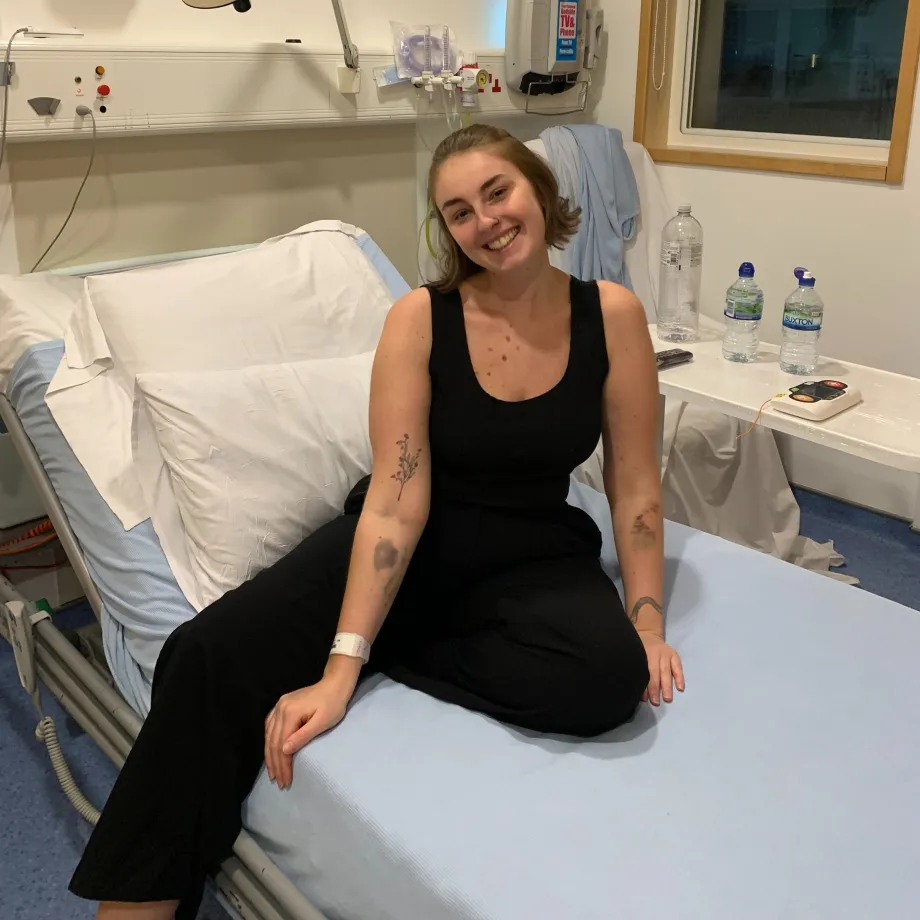
Antonia in hospital
Moving forward
I'm in a new relationship and I've recently started the first job I’ve had since having cancer, as a journalist at my local newspaper. It's completely different to what I was doing before, but I’m really enjoying it. I guess that when you've had such a big life change, naturally your career and other aspects of your life change with it.
It has been quite a big adjustment to get in the swing of things, but it's nice to have some sort of normality in my life back. Work has been really supportive and given me necessary adjustments. I think that's so important because when I was deciding to go back to work, I thought it would be unachievable, because I was struggling with fatigue and not feeling great. It's been a big positive for me.
Create a brighter future for children and young people like Antonia
By supporting us, you’re driving life-changing progress and making a real difference to young lives. Join us today to help shape brighter tomorrows.

